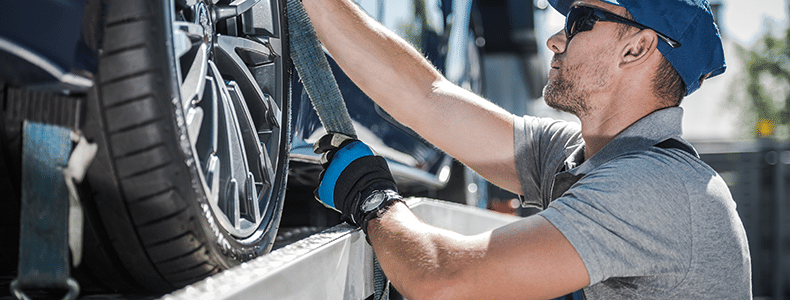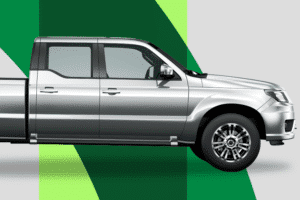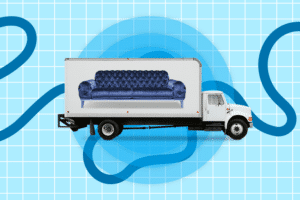Transporting your vehicle can be stressful. Choosing the wrong transporters can lead to damaged vehicles or delivery delays, which can leave you feeling frustrated and overwhelmed. So how do you find a reliable vehicle carrier without breaking the bank? One word: uShip.
At uShip, we make it easy to find a reliable vehicle carrier. Our website gives you the tools you need to obtain quotes from highly rated companies. You can also read past customer reviews and check ratings for each carrier before you decide, ensuring your vehicle arrives safely and on time.
Join the millions of people who have used uShip to move cars, boats, RVs, and more. The process is simple:
- Post your transport job
- Review carriers by reading profiles and reviews
- Choose your carrier with confidence
Want to make sure your next vehicle transport goes smoothly? We’ve got you covered. Here are the top qualities to look for to choose a reliable vehicle carrier that fits your needs.

1. VET FOR REPUTATION AND RELIABILITY
Hiring a reliable carrier is crucial if you’re preparing to ship your vehicle to a new destination. After all, you’re trusting a service provider with a prized possession. One wrong move could lead to expensive damages, delivery delays, or headaches getting compensation.
That’s why it’s essential to research carriers before booking. This due diligence helps minimize blunders and ensures your car, SUV, truck, or motorcycle arrives safely at its destination. But where should you start the vetting process? What specific factors indicate an auto transport provider you can depend on?
2. CHECK REVIEWS AND TESTIMONIALS
While low rates may catch your eye at first glance, a carrier’s reviews and testimonials give unfiltered insight into quality. At uShip, we provide first-hand feedback on aspects like:
Responsiveness: Did the company promptly return calls and answer questions?
Care in transit: Were vehicles shipped without incurring damage?
Timeliness: Did the carrier pick up and deliver vehicles on schedule?
Seeing rave reviews for punctuality or careful handling should give you peace of mind. Meanwhile, complaints about damaged goods or lapsed communication are red flags to look elsewhere. An impressive 4+ star rating across dozens (or hundreds) of reviews indicates a respected, reliable auto shipper to consider.
3. CHOOSE A CARRIER WITH A LICENSE AND INSURANCE
While customer feedback reveals professionalism and care, a carrier’s credentials indicate they operate a legitimate business. Make sure your service provider has an active DOT number, which shows that the U.S. Department of Transportation licenses them. This validates they comply with all regulations like adequate insurance coverage.
Regarding coverage, consider only partnering with carriers boasting at least $100,000 of cargo insurance. This protects you financially if vehicles incur damage en route. For vintage, classic, or high-end vehicles, secure carriers with insurance upward of $250,000-$500,000 for complete protection.
Calling to confirm licenses and coverage shows due diligence. At uShip, we display credential details prominently on carriers’ website profiles to help our customers find the best fit for their transportation needs.
By verifying stellar reviews, credentials, and insurance, you can hire a carrier with complete confidence that your vehicle remains safe and secure from origin to destination. Remember: Don’t leave items like reputation and qualifications to chance. Do your homework thoroughly before entrusting your precious cargo to drive off into the sunset.
4. KNOW ABOUT THE SERVICE OPTIONS
When hiring an auto transport company to ship your car, SUV, motorcycle, or other vehicle, you’ll want to understand the core services offered. This allows you to choose the right solution based on your budget, timeline, and specific needs. Below, we overview the main options for encased transport, delivery methods, and specialty offerings.
ENCLOSED VS. OPEN TRANSPORT
The first decision you may need to take is choosing between enclosed or open carrier:
Enclosed auto transport involves shipping vehicles inside an enclosed trailer protected from road debris and weather. This is recommended for high-end, vintage, and classic vehicles requiring white glove treatment door-to-door. Enclosed trailers have a higher limited capacity (1-5 vehicles). Enclosed transport rates run higher than open transport.
Open auto transport ships vehicles stacked on an uncovered trailer behind a truck. This budget-friendly option works well for daily drivers and hardy vehicles (jeeps, trucks). Open trailers carry 7-10 vehicles for cost efficiency.
Pro Tip: Assess your vehicle type, value, and desired protection to determine whether enclosed or open transport fits your needs and budget.
DOOR-TO-DOOR VS. TERMINAL-TO-TERMINAL
The other key choice is the delivery method:
Door-to-door auto transport involves pickup and delivery from your home, office, or other specified address, so there’s no need to drive vehicles to depot lots. Convenience does come at a ~20% premium over the terminal shipping options below.
Terminal-to-terminal shipping requires driving your vehicle to and from designated depot yards. While cost-effective, terminal transport takes more time and coordination. Depots span significant metros across the U.S.
Pro Tip: Weigh factors like convenience, logistics, and price sensitivity to decide which delivery method makes the most sense. Hybrid options like delivering to/from terminals also exist.
SPECIALTY TRANSPORT SERVICES
Reputable auto transport providers also offer unique solutions for RVs, exotics, snoopers, and more:
RV transport involves enclosed trailers, door-to-door delivery, and gold-standard handling.
Exotic car shipping provides enclosed white-glove service for high-end vehicles.
Inoperable vehicle transport uses special equipment to haul non-running cars and trucks.
Whether you need standard enclosed shipping or specialty inoperable transport, understanding these key service options can help you pick the best provider to trust with your possessions.
5. READ THE FINE PRINT: PRICING AND PAYMENT
When it comes to auto transport, hidden fees and confusing quotes can leave you with sticker shock. Before committing your signature (and cash) to the dotted line, here’s what you’ll need to know to make the best decision for your wallet.
6. UNDERSTAND QUOTES VS. ESTIMATES
Quotes and estimates aren’t always created equally, so make sure you’re comparing apples to apples. Determine whether the initial numbers presented are binding quotes or non-binding estimates. This can make or break your transport budget.
Quotes lock in guaranteed pricing upfront. For example, a quote of $800 means your bill totals $800 at job completion, excluding any optional add-ons. Quotes protect against fluctuating costs down the road.
Estimates provide ballpark figures that may shift before pickup. For instance, an estimator may quote $600 based on mileage. But if transport routing or days change, so could your final tab. To avoid breaking your budget, take the time to obtain guaranteed quotes before pulling the trigger.
A reliable vehicle carriers can break down expected fees for transport days, mileage, and other factors, so customers can accurately weigh options without surprises.
7. WATCH OUT FOR HIDDEN FEES
This is the dreaded “fine print” portion of auto transport. Scan pricing and service details with an eagle eye to avoid being blindsided by tacked-on fees down the road, including:
Origin/destination charges: These charges involve fees for pickup or drop-off beyond 25 miles from significant metros.
Expedited shipping: Expedited shipping, or faster-than-standard transport, incurs a higher charge than standard shipping.
Enclosed trailer upcharge: Enclosed trailer fees may be charged for covered (enclosed) transport, while open-carrier transport offers a more cost-effective option.
Ask for an itemized quote accounting for all potential fees to weigh options accurately without unwanted add-ons sabotaging your budget later.
PAYMENT SECURITY
Maybe you’ve already found a reliable vehicle carrier with upfront pricing, but it’s important to ensure your provider has clear payment terms and methods before paying any deposits. Standard secure payment options include wire transfers, cashier’s checks, and PayPal.
PRIORITIZE RESPONSE CUSTOMER SERVICE
Whether you’re transporting your vehicle across town or moving to a new state, auto transport requires trusting a carrier with your prized possession. That makes customer care and support extremely important before, during, and after your car makes its journey. Here is what to look for in a service provider’s customer service.
ACCESSIBILITY AND SUPPORT
You should test companies’ response times when evaluating them. Call during standard business hours and see how quickly someone answers or calls you back. A reliable vehicle carrier will have dedicated staff ready to advise you on questions, no matter how small. This shows they genuinely value customer experience.
Also, be sure to check reviews to confirm that past users found staff accessible when needing assistance. Complaints of calls going to voicemail or emails receiving delayed replies are red flags of poor service.

HANDLING DISPUTES AND CLAIMS
While problems are rare with established carriers, you still want assurance that your provider has procedures to address disputes or damage claims. Look for clear explanations online of their claims process, standards for resolving issues, and average timeframes. Reaching a live person to discuss matters shows a focus on making customers whole again.
For those who purchase added protection with uShip, simply follow the steps to submit a case and let our team handle the rest!
RELIABLE VEHICLE CARRIER SAFETY RECORDS AND PRACTICES
In addition to ample insurance, you want confidence that your carrier follows rigorous safety protocols. Best-in-class carriers take steps to provide the best service for their customers, including:
Screening all drivers for licenses, background checks, and clean records.
Using state-of-the-art dispatch routing for efficiency.
Offering real-time shipment tracking from origin to destination.
Welcoming third-party inspections of vehicles pre- and post-transit.
These standards minimize risks en route so you can rest easy. By vetting both insurance policies and vigilant safety records, you’ll gain complete visibility into a company’s capability to transport vehicles damage-free. Don’t leave the protection to chance and assumptions. Ask the right questions upfront for ultimate assurance.
EXPLORE CARRIER EXPERIENCE AND EXPERTISE
You want confidence that your favorite set of wheels receives white-glove care, and that requires a service provider with specialized expertise tailored to your shipping needs. As you evaluate different transportation options, dig into these key considerations.
SPECIALIZATION IN VEHICLE TYPES
Not all carriers are created equal when it comes to experience transporting specialty vehicles. Make sure potential carriers have proven expertise specifically handling your make/model, including:
- High-end vehicles need enclosed trailers, lift gates, and threshold ramps.
- Classic/vintage cars require condition reports and display straps.
- Motorcycles require secured upright transport systems.
- RVs and campers often need extended ramps and height clearances.
A reliable vehicle carrier with decades of experience in Hondas might pale in experience transporting six-figure exotics across the country. As a result, it’s best to look for demonstrated specialization instead of broad, general claims. Ask targeted questions to assess hands-on expertise transporting vehicles identical to yours.
NATIONAL VS. INTERNATIONAL SHIPPING COMPANIES
Consider both the geographic breadth and depth of transport networks. Even large U.S. networks may need more specialized overseas partnerships for international car transport.
Domestically, you want a reliable vehicle carrier with multiple drivers located in or able to travel to your city quickly. A transport broker aggregating third-party drivers can need help meeting precise pickup timing versus a company with dedicated driver employees.
Whether you need specialty enclosed motorcycle shipping cross-country or overseas vehicle transport to Asia, choose a provider whose capabilities align with your precise requirements. With prized possessions on the line, experience matters. Vet carriers thoroughly and leverage referrals from fellow owners of classic cars, high-end vehicles, or specialty equipment. It’s worth going the extra mile to ensure your vehicle receives white-glove care.
WHY CHOOSE USHIP?
Finding a trustworthy auto transport company is essential when shipping your beloved vehicle. The best providers have:
Stellar reviews affirming careful handling and timely delivery.
Reasonable pricing, including guaranteed quotes without hidden fees.
Responsive support and proven policies handling disputes.
Find experienced carriers with a history of transporting vehicles like yours.
This checklist helps safeguard your vehicle, timeline, budget, and peace of mind when coordinating logistics.
Ready to transport worry-free? At uShip, we’re trusted by over three million shippers across equipment types, delivery scopes, and destinations nationwide. Quickly receive custom quotes tailored to your job from reliable vehicle carriers, motor carriers, and specialty equipment movers.
Visit uShip today to evaluate options for your upcoming vehicle transportation and relocation needs. The hardest part is over. Now, it’s time to focus on the smooth ride ahead!
FREQUENTLY ASKED QUESTIONS (FAQS)
What is the safest way to transport a vehicle?
The safest method is hiring an enclosed carrier. Your vehicle travels protected inside a covered trailer, safe from the elements and road debris. Open auto transport with multiple vehicles stacked on an uncovered trailer is more affordable but leaves vehicles more exposed.
How do I choose a reliable car shipping company?
Read online reviews. A reliable vehicle carrier will have 4+ star ratings from hundreds of customers, affirming timely, damage-free delivery. Also, verify their licenses and insurance credentials to ensure legitimate business practices.
How much does it cost to ship a car across the country?
Open auto transport costs $0.40-$0.60 per mile for midsize cars and SUVs. Enclosed trailers cost 2-3x more. For a 3000-mile trip, estimate $1,200-$1,800 for open transport or $3,600-$5,400 for enclosed.
What are the benefits of enclosed auto transport?
Enclosed trailers prevent exposure to road debris and weather extremes, keeping vehicles pristine. White-glove services also include added handling protections upon loading/unloading. Enclosed transport is ideal for classics, exotics, and high-value vehicles.
Can I ship my car with personal items inside?
Most carriers allow personal items below maximum weight limits. Confirm with your carrier first, and remove valuables, electronics, cash, and any other belongings that would be difficult or impossible to replace if damaged.



